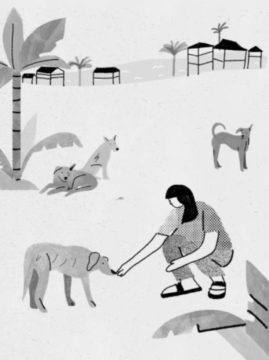Usha Alexander at the RSPCA:
 When thinkers and naturalists do talk about complex animal behaviours, their approach is usually constrained by the principle that when we imagine we see human-like motives, impulses and feelings in other animals, we must assume we’re only projecting our humanity onto them, the way we see human faces in the clouds.
When thinkers and naturalists do talk about complex animal behaviours, their approach is usually constrained by the principle that when we imagine we see human-like motives, impulses and feelings in other animals, we must assume we’re only projecting our humanity onto them, the way we see human faces in the clouds.
But what if it’s not that? What if, in fact, it’s the opposite: not me imbuing a non-human animal with human emotionality but, rather, me recognising the common feelings and sentience of non-human animals within myself? After all, science also tells us that we evolved from the same source as all other animals, that we share a great deal in common with our fellow species, from our DNA and physiology to our enmeshment in a web of deep ecological interdependence. Though widely accepted, this knowledge of our relatedness remains, for many of us, merely a scrap of abstract and esoteric information, detached from our more foundational philosophical certainty of human exceptionalism, supremacy and paramountcy.
More here. And an essay by Frans de Waal on the same theme here.
